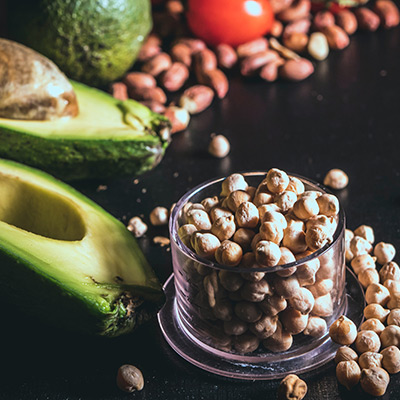 What you eat depends how fast you want to get into a ketogenic state. The more restrictive you are on your carbohydrates (less than 25g per day), the faster you will enter ketosis. Normally, anywhere between 20-30g of net carbs (total dietary carbohydrates minus the total fiber) is recommended for weight loss, but the lower you keep your glucose levels, the better the overall results will be.
What you eat depends how fast you want to get into a ketogenic state. The more restrictive you are on your carbohydrates (less than 25g per day), the faster you will enter ketosis. Normally, anywhere between 20-30g of net carbs (total dietary carbohydrates minus the total fiber) is recommended for weight loss, but the lower you keep your glucose levels, the better the overall results will be.
On the ketogenic diet, your macronutrient intake should be around 60-80 percent fats, 20-30 percent protein, and five percent carbohydrate.
Limit your carbs and think about eating 100 percent Paleo — no beans, grains or legumes, and have most of your calories come mostly from vegetables and nuts. Avoid refined carbohydrates such as wheat (breads, pastas, cereals), starch (potatoes, beans, legumes), and fruit.
Eat plenty of dark green, leafy vegetables. Most of your meals should include a small portion of protein with vegetables, and an extra side of fat. For example, chicken breast basted in olive oil, with a side of broccoli and a couple of slices of avocado. Steak topped with butter, and a side of spinach sautéed in olive oil. Adding nuts, seeds, olives, almond butter and other nut butters can do a lot to curb your appetite.
I am a fan of using ketogenic diet principles to help make the body insulin sensitive. However, I am not a fan of long-term ketogenic diets for healthy adults. It is part of the tool chest I use in my Menopause Metabolism Mastery Program to help women lose weight. But it is not the only tool and does not work in all women and may lead to problems later on if you eat a ketogenic diet long-term.
Current research indicates that long-term use of a ketogenic diet can reduce insulin sensitivity, which is important for your ability to be metabolically fit, and increase reactive insulin resistance. This means that you lose the ability to use carbohydrates efficiently as fuel if you have done a long-term ketogenic diet.
Questions? We Have Answers
If you’re interested in learning more about the ketogenic diet but aren’t sure where to start, we’re here for you. Our team is ready to help you unlock your true health potential through custom-crafted, focused care and nutritional support. Get to know more about a diet that can work for you when you contact us to book an appointment today. As your Dallas Nutritionist, we can’t wait to help you thrive!
